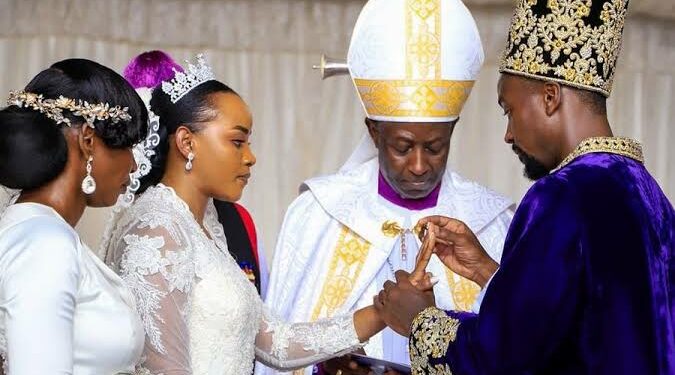By Aggrey Nshekanabo
In a breathtaking spectacle of opulence and tradition, the weekend of November 18th, 2023, witnessed Busoga Kingdom inscribing a new narrative in its history—an extravagant blend of momentous occasion and an unparalleled cultural tourism spectacle. The Kyabazinga, Isebantu William Gabula Nadiope, elevated the weekend to regal heights as he clasped the hand of Inhebantu, Jovia Mutesi.
This was no ordinary wedding. The kingdom last witnessed such in 1956 when the then Kyabazinga Henry Wako Muloki embarked on a matrimonial jounrney with Inhebantu, Alice Kintu.
Beneath the sacred arches of Christ Church at Bugembe, the wedding ceremony unfolded with an air of grace and solemnity, presided over by the Archbishop His Grace, Rt. Rev. Stephen Kazimba Mugalu, of the Church of Uganda. The Queen of Buganda, the ever radiant Nabaggerekka Sylvia Nagginda, stood as witnesses to the sacred union.
The queen of Bunyoro, Omugo Margaret Adyeeri Karunga and Nyin’Omukama wa Tooro, Best Kemigisa, were in attendance. The political elite of Uganda cast their presence, with the Vice President, Her Excellency Jessica Alupo, and the Deputy Speaker of Parliament, Thomas Tayebwa, added another layer of prestige.The former Vice President Dr. Specioza Kazibwe and the former Speaker, Hon. Rebecca Kadaga, graced the occasion not merely as political figures but as esteemed subjects of the King of Busoga himself.
The wedding of the King of Busoga, evoked memories of Uganda’s last historic union, nearly a quarter century ago, when the Kabaka of Buganda, His Highness Ronald Muwenda Mutebi, wedded his official wife, the Nabaggereka, Sylvia Naginda Luswata. The anticipation for this event was palpable and unstoppable. In a nation marked by political polarisation and economic challenges, the wedding emerged as a much-needed respite.
Remarkably, the festivities left an indelible mark on Jinja town. High-end hotels and lodges in Jinja reached full capacity, turning the town into a vibrant hub of jubilation. This phenomenon, rarely witnessed, prompts reflection on the idea of holding weddings in hometowns, a practice that not only showcases traditional foods but also engages local service providers, injecting a welcome economic boost into these communities.
Reflecting on a personal experience, I recall a Saturday when, instead of resting at the lodge, I took visiting clients to a wedding in Bunyaruguru, my village. The excitement was palpable as we shopped for traditional attire (gomesi, omwenda, and ekitambi). The wedding became the highlight of my clients’ visit to Uganda, with the MC emphasizing its historic nature as the first witnessed by tourists in the village, adding a unique layer to their travel experience.
I hope travel agencies will incorporate such cultural events into their itineraries, potentially even monetizing these experiences. Many tourists, would relish the opportunity to participate in these authentic cultural celebrations. A juxtaposition with Western wedding norms highlights the unique grandeur of Ugandan ceremonies, where a gathering of 200 is considered average and modest, and 100 is deemed rather minimal.
Showcasing the kuhingira in Nkore and Kigezi or the kwanjula in Buganda spark excitement, as these seemingly simple yet culturally rich events possess untapped economic potential. As Uganda opens its arms to the world, these celebrations could become valuable additions to the nation’s tourism repertoire, offering both cultural immersion and economic dividends.
Aggrey is a travel writer based in Kampala and works with Naalya Motel & Kyambura Safaris Ltd
aggrey@kyamburasafaris.com +256 775 414 596
Do you have a story in your community or an opinion to share with us: Email us at editorial@watchdoguganda.com













